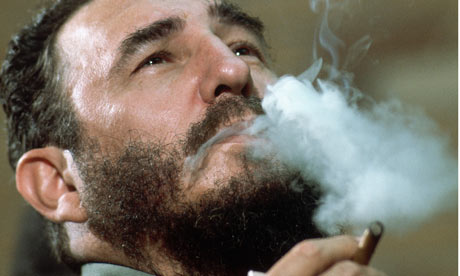Elderly revolutionaries joined young doctors, famous musicians, government workers and former guerrilla fighters in Havana’s Plaza de la Revolución as thousands lined up to pay their last respects to Fidel Castro.
Some carried flags. A few had flowers. All came with memories of the guerrilla leader who overthrew a dictatorship, resisted a US-led invasion, faced down a nuclear superpower and dominated the island’s political life for half a century.
At the start of the official commemorations, Orlando Gómez had come with his wife to bid farewell to his old comrade in arms. Waiting in the hot sun to sign the condolence book, he recalled the first time he had gone into combat with Castro in March 1958.
A few weeks earlier, Gómez – then an idealistic 18-year-old – had left his home in Havana to join the small rebel army in the Sierra Maestra mountains. He had been put in charge of a mortar unit for the attack on an army garrison at the San Ramón sugar mill. The battle lasted from midnight to 4am. Four guerrillas were killed, but they destroyed the mill and the barracks before returning to their base in the mountains.
“Fidel led by example. He was always in the frontline. He walked faster than everyone. He never stopped moving, but he was very approachable. You could always talk to him,” he recalled. “I want to say goodbye to this extraordinary man. He was a great guerrilla leader and tactician.”
Others remember Castro as a leader who stood firm during the Bay of Pigs invasion of 1961 and the Cuban missile crisis, when the world was taken to the brink of nuclear war over the Soviet Union’s efforts to build a missile base on the island.
“He was very open with the people about the threat we faced and how we must pull together to protect our liberty,” said Jorge Jorge, a university teacher who had arrived two hours earlier with a group of friends. “We have come here to share our grief and to show our determination to hold on to Fidel’s ideals. He taught us how to share.”
Like many in the crowd, he had often come to the square to hear Castro deliver his marathon orations, some of which lasted more than six hours. They were often at times of hardship – of which there were many: the death of Che Guevara, the fall of the Soviet Union, and the exodus of migrants escaping economic crisis or political crackdowns.
There is widespread recognition of Castro’s failures, and many – particularly among the young – balk at his dictatorial rule. But this was not the time or the place or the crowd to dwell on the negatives.
“I was born in a poor black family. Thanks to the revolution, I had opportunities that did not exist before,” said Tony Ávila, one of the island’s most famous musicians, who said he had been called up the previous night by the culture ministry and told to attend. He appeared more than happy to do so. “I’m here because of Fidel. He was everything to me.”
It was not just Cubans paying homage. Many foreigners were present – out of curiosity or shared political beliefs. Chilean Alberto Reyes arrived with a handmade flag and a photograph of the dead revolutionary who had inspired him as a youth to join the Manuel Rodríguez Patriotic Front – one of several dozen groups across Latin America that were committed to armed struggle against the rightwing dictatorships that held power across most of the region in the 1970s and 1980s.
“He was the light in the lighthouse. More than any other leader, he unified Latin America,” said Reyes, who has lived in Havana since the 1990s.
Many turned up in groups, bearing flags or wearing the uniforms of customs officers or doctors. “I’m here because he gave me the chance to enter medicine,” said Beatriz de la Cruz Quila, a 21-year-old medical student at the Institute of Gastrointestinal Medicine – one of several dozen institutions created after Castro took power in 1959.
The commemoration will continue in Havana until a ceremony on Tuesday night.
Then on Wednesday, Castro’s ashes will begin a three-day procession east across the island, going back along the route the victorious rebel army took from the Sierra Maestra to the capital to topple Fulgencio Batista in 1959.
Castro’s remains will be interred on Sunday morning in Santa Ifigenia cemetery in Santiago, which is also the resting place of José Martí, the hero of the 19th-century war of independence against Spain.
That will mark the end of nine days of mourning. Since Fidel’s death on Friday night, the media have run blanket coverage of tributes, interviews, historical documentaries and footage of diplomatic trips and speeches by Castro. Musical performances have been cancelled and bars have been prohibited from selling alcohol.
“There’s a genuine feeling of mourning, that’s not a formality, that’s not showy, that’s not outward-focused, but rather completely intimate,” the former national assembly president Ricardo Alarcón said on state television on Sunday.
Not everyone is grief-stricken. Democracy activists have cheered the demise of a leader who repressed political opponents, denied freedom of speech and restricted travel and religious worship.
One woman at the Plaza de la Revolución, who only gave her first name Milena, said she was sad but determined to take something positive from the moment. “He should be remembered as a revolutionary who believed in social justice and fought for free public health and education. We need to maintain this. His ideas should live forever”










